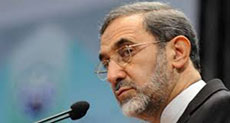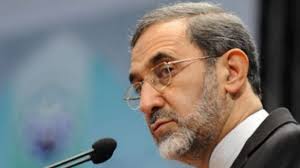Velayati: Iran Won’t Leave Al-Assad, Resistance in Lebanon, Palestine

Local Editor
Advisor of Imam Khamenei on International Affairs, Ali Akbar Velayati, stressed that Iran has the enough defensive power to deter anyone from attacking it. "Regarding our power, independence and self-confidence, we are considered the first power in the world," he said, adding that "no one supported Syrian President Bashar al-Assad as Iran did, even Russia didn't offer such support."

Interviewed by as-Safir newspaper, Velayati noted that Iran paid the expenses of its independence by bearing the burdens of the economic embargo.
He further mentioned that "each country and every president, whether in the Islamic world or in the Third World, doesn't dare to criticize America and "Israel" as the Leader Imam Khamenei bravely does."
"Aided by Hizbullah and Iraq, Iran supplied President Bashar al-Assad with necessary support, and aborted the American plan in Syria, Lebanon and Iraq," Velayati said. He also asserted that "Tehran would never give up on al-Assad, Iraqi PM Haidar al-Abadi, the Resistances in Lebanon and Palestine, i.e. Hamas and Islamic Jihad Movement in Palestine. As long as this is our stance, the economic embargo will continue."
In this regard, Velayati said that "Over the past 37 years, Tehran has been subjected to total trade embargo and economic blockade, yet it was able -on both the military and security levels- to possess the defensive power through which nobody would dare attacking us."
"Regarding our power, independence and self-confidence, we are the first power in the region," he added.
Imam Khamenei's Advisor considered that the "cooperation with others must be based on respect." On this level, he highlighted that we should not beg to establish such cooperation, because the others don't beg anybody."
He further added that "In front of the power, we have to be powerful. From the White House to the Cabinet, and from the Élysée to Buckingham in the UK, everybody says that Iran must definitely be present."
Velayati confirmed that "the future of the region belongs to its peoples, and Iran is the spinal cord of this stability. Although we don't see a comfortable present, yet we harbor hopes on the future."
"We are offering martyrs in Syria, and we don't consider Syria separate from us. We offered martyrs in Lebanon and Iraq, and we will offer. We helped them as much as we can."
On the economic level, the top Iranian official assured that his country will not suffer from and economic collapse because it is open. The government, despite all the current problems, is running the country. He mentioned that "a war of propaganda is conducted against Iran, and it is represented by publishing and spreading the rumors telling Iran will economically collapse." He also asserted that "what is being said is totally wrong."
Velayati addressed the Europeans and the Americans as he said: "In addition to the economic cooperation, a strategic cooperation is emerging between Iran, Russia and China, Syria is a current example on this cooperation,"
He further expected that "This agreement would reach Iraq as well, in case its government had the chance, as Russian President Vladimir Putin announced at the UN in late September that the coalition was made clear between Iran, Russia, Syria and Iraq."
In this context, he stressed the cooperation between Iran, Russia and China is growing bigger, noting that "the relations are tending to be strategic, in which an Iranian-Chinese-Russian axis would be created."
"Those two countries wouldn't find in the Middle East a country which is more powerful and independent than Iran to establish such strong ties with it. The Chinese said this frankly," he continued.
Whether the decrease in oil prices was an American political decision, or it is related to the market, Velayati answered that "America and Saudi Arabia colluded together to decrease the oil prices, hence to pressure Iran and Russia."
"Turkey is operating in Syria with all the power it has against President al-Assad. We are keeping our friendly relations with Ankara. We are keeping this policy, but we have different views on Syria," he said.
Velayati further stressed that "hadn't we supported President Assad, had we allowed the fall of Damascus, the situation in Syria would have been worse than the situation in Libya."
"They were planning to partition Syria into five countries, just as they dream to divide Iraq into three countries. Tehran halted this plan. If Iran's stance was different, Damascus and Baghdad would have fallen," he said.
Velayati rejected what was reported on Iranian sensitivity regarding the powerful Russian intervention in Syria: "As long as we trust the strong relations between Russia and Syria and Russia and Iran, and as long as we are sure that the communication is based on equality and mutual respect, we are not worried, we are observing the issues so that the relations would be based upon this."
He stressed that the position of al-Assad in the meantime is stronger than any time. This is moving forward, and the "situation in Iraq is not desperate". He stressed that the situation will improve there, and the fate of the war in Syria will reflect positively on the situation in Iraq. He also said that the issues will be solved there but it is not easy. The importance of Iraq is greater than any other country's importance.
Regarding the Yemeni issue, Velayati noted that "the danger of the Sunni-Shiite unrest has been existing since 1400 years, but as long as the wise people of both sides are running the issue, then we don't have to worry about it."
Finally, Velayati said that "the extremists in the region are hiding behind Saudi Arabia, or are active with the Saudi money, and they are doing horrible actions in the Waziristan caves."
"The public opinion could not accept their deeds, as a Sunni wearing an explosive belt that he detonates in a Shia mosque, or a Shiite opening fire on a Sunni," he concluded.
Source: as-Safir, Translated and Edited by website team
Comments




